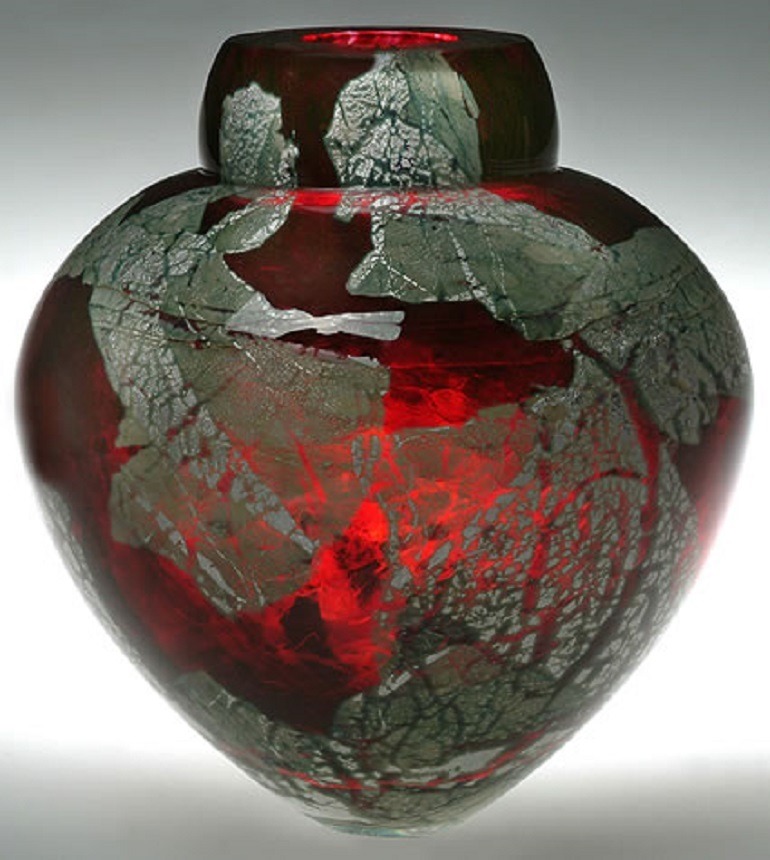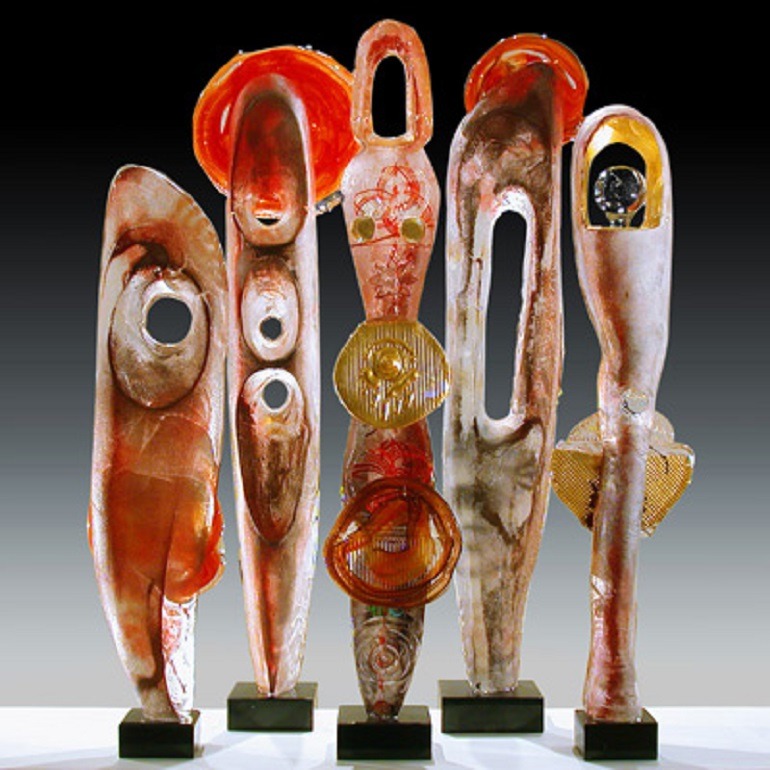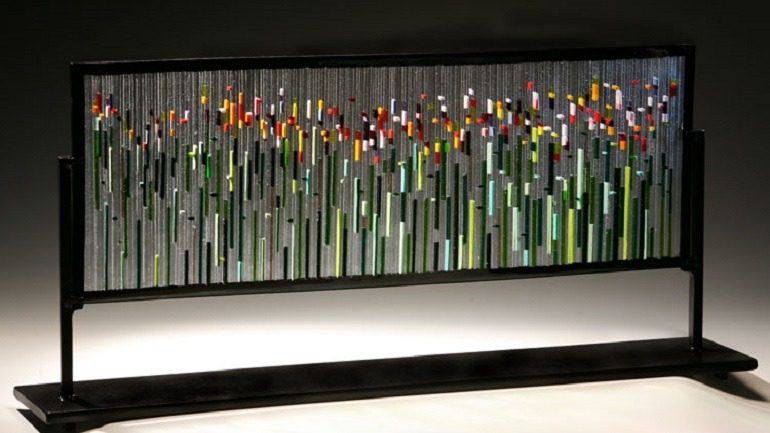ART & DESIGN
Loy Allen, Glass, and metal Tomato sculpture, glass art. Image courtesy of American Craft Council Show
ART FAIR
Glass art artists showed stunning glass sculptures, figurines, vases, mosaics, and stained glass at the Baltimore Craft Show. Here are the top glass art artists at the event.
BY KAZAD
BALTIMORE, MD– Glass art was one of the major attractions at this year’s American Craft Council Show in Baltimore. Glass artists from across the country presented stunning designs that captivated art lovers. While some of the glass artists pushed the boundaries of glass art, others embraced the traditional style of glass making. From flower vases to bowls, glass sculptures, and stained glass, the artists did not disappoint the teaming arts and craft lovers that had converged at the Baltimore Convention Center.
Top Glass Art Artists
Although there were many exceptionally creative glass art artists at this year’s event, five of them stood out from the rest. Arts and crafts enthusiasts crowd their stands because of the unusual quality and high aesthetics of their works. More importantly, their works were absolutely intriguing. It was fascinating watching art lovers as they struggle to understand and unravel the creative process that went into the creation of the masterful glass art pieces.
Here are the top glass art artists at the American Craft Council Show in Baltimore.
Loy Allen
Loy Allen’s glass art is captivating. The artist combines elements from nature to achieve high aesthetics. Flowers, insects, bugs, and reptiles are major sources of inspiration for Allen. Viewed before light, the objects glow, giving life and movement to these static art objects. Some of Allen’s objects are for decorative purposes, while others are utilitarian. Her bottle designs are hidden within beautiful flowers to hide their functional value. Her stylistic approach is akin to Art Nouveau. Like artists of that era, Allen is inspired by natural forms and structures. The flowers, plants, and curved lines inherent in her designs are reflective of her connection to nature.
ARTS & CRAFTS FAIR: Arts and Crafts Lovers Converge in Baltimore for Craft Show
A native of South Dakota, Allen studied design at Southern Illinois University at Carbondale where she graduated with a Bachelors of Art in 1975. Soon after, she went to study advanced glass techniques at the Penland School of Crafts in North Carolina and at The Studio at the Corning Museum of Glass in New York. Her contemporary glass art brings attention to the beauty of creatures that are often considered ugly.
Ed Branson
Ed Branson’s glass artworks are delicate beauties. They glow brilliantly sitting on pedestals at the American Craft Council Show in Baltimore. Although many of Branson’s glass art is high in aesthetics, they were designed for everyday use. From bowls to vases and pitchers, all his designs are made to serve everyday purposes.
The balance between utility and beauty is what owners of Branson’s creative glass art will have to contend with. To use or not to use? Branson’s art has its unique characteristics. While some of the shapes were influenced by nature, others were the result of experimentation. Beyond his training with the world’s glass art masters, Branson’s trust for glass and the desire to have fun with his creative process, has led to an amazing career in glass art.
Susan Gott
Totemic Glass Sculptures
Susan Gott’s totemic glass sculptures show her brilliance and experience in glass art. Her works are inspired by mythological imagery, symbolism, and philosophies from historic and ancient cultures. Gott’s glass sculptures are outstanding in the true sense of the word. They reveal the experience of her travels and love of ancient civilizations, symbols of ritual art, and myths.
For more than 30 years, Gott has worked in glass, creating one-of-a-kind cast glass sculptures. Her brilliance as an artist and glass sculptor has won her many awards, including the American Craft Council Award of Excellence. She has also won First Place in many exhibitions. Her work can be found in major galleries, private, and corporate collections in the United States and across the globe.
Gott grew up in Virginia and Tennessee and resides in central Tampa. She has a Bachelor’s from Radford University and a Master of Fine Arts degree in glass from Kent State University. Additionally, she studied glass at Pilchuck, Haystack, Arrowmont, and Penland Schools. -Stained Glass
Ernest Porcelli -Stained Glass
Ernest Porcelli’s stained glass art is what distinguished him from other participants at the American Craft Council Show in Baltimore. Many of the visitors at the art event could not stop asking him how he created such amazing stained glass pieces. His lamps were particularly magnetic and attracted many art lovers. Art lovers thrang his stand throughout the event just to see his creative lamps. The lamps with their multicolored shades cast new light and mood in their environment. In addition to the lamps are sculptural glass art, screens, windows & doors, and mirrors.
Porcelli’s stained glass art has brought him great recognition. In 2004 and 2005, he was a finalist for the distinguished Niche Award. His work has also received notable attention in national publications, appeared in major motion pictures, and featured in museums and galleries nationwide. Porcelli works out of Brooklyn, New York. He has practiced the craft of stained glass art for more than 30 years.
Randi F. Solin

Randi F. Solin, Gold Ruby, 7 x 6.5 x 6.5 in. Hand blown, free-form glass off the pipe, colored with gold ruby frit and a multi-layering of the sterling silver leaf. Cut and polished top. Image courtesy of American Craft Council Show
There is a mysterious element to Randi F. Solin’s glass art. Every look brings a new experience and there is always something new to discover. Guests to the American Craft Council Show in Baltimore stared at her pieces with total devotion as they quest to unravel their hidden mysteries. Then, just when they thought they had discovered the hidden meaning, they find something new.
Looking at Solin’s glass art is like looking at an abstract expressionist painting. Lines intersect with lines just as shapes converge to create endless movement. It is like every element of the design is in constant flux. That is what makes Solin’s glass art very engaging. Her Window Series, for instance, invites viewers to interact with the object. The experience is always different from one individual to another.
Solin’s Window Series is remarkably different from her other works. Her Emperor Bowl series, for instance, borrows from ancient pottery forms designed to hold one flower. Unlike the Window Series that is in the abstract expressionist tradition, the design of her Emperor Bowls are reminders of the impressionist landscapes. Aliyah External, for instance, is reminiscent of Claude Oscar Monet’s Water Lily Pond. Tiny leaf-like organism embraces the bowl just like Monet’s painting, creating magnificent optics.
Painting Glass Art
The similarities between Solin’s glass art and her paintings are not accidental. Solin approaches her work two-dimensionally “like a painter to a canvas or a weaver using thread to create an intricate tapestry.” This approach to glass art allows her to develop her forms which are then taken through her complex coloration process. On her complex coloration process, Solin notes: “I build layer upon layer of color using glass in all particle sizes–powder, cane, fruit, and rod-like a painter’s palette, to create original homogeneous coloration and truly one-of-a-kind work.”
Solin’s glass art display at the American Craft Council Show in Baltimore highlights her exceptional technical skill. Her highly inventive coloration style is captivating. As expected, her works are in major collections across the globe. She has also won many awards, and her works have been in important museums and galleries shows in the United States and around the world.
Selecting the five artists celebrated here was most challenging. This year, like other years, featured exceptional glass art artists whose works are aesthetically pleasing. Their works were major attractions for young artists and art lovers. Several artists had demonstrations for guests who tried their hands at the glass making process. Loy Allen, Ed Branson, Susan Gott, Ernest Porcelli, Randi F. Solin are just a few of the artists that made the mark at this year’s event. Beyond the aesthetics of their works, their creative genius also captivated the audience at the American Craft Council Show in Baltimore.



